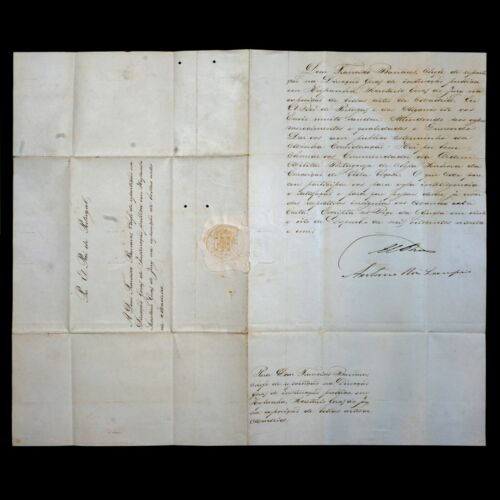-40%
Royalty King Luis I of Portugal Signed Royal Document Autograph Manuscript Order
$ 422.37
- Description
- Size Guide
Description
For your consideration is a rare and important hand-signed royal manuscript document by King Luis I of Portugal(1838-1889)
.
Fine antique signed Portuguese royalty document / letter / order / decree / edict is concerning the appointment of Dom Francisco Banares, Head of the Department of General Directorate of Public Instruction of Spain and General Secretary of the Exposition of Fine Arts in Madrid. Nomination as Commander of the Portuguese Military Order of the Immaculate Conception of Villa Vicosa, hand-signed by King Luis I of Portugal and dated 28th December 1871. Bearing original fine armorial royal paper and wax seal bearing the King's Arms.
Size is approximately 27.5 x 21.5 cm.
Dom Luís I (31 October 1838 in Lisbon – 19 October 1889 in Cascais), known as The Popular (Portuguese: O Popular) was a member of the ruling House of Braganza,[1] and King of Portugal from 1861 to 1889. The second son of Maria II and Ferdinand II, he acceded to the throne upon the death of his brother Pedro V.
Luis was a cultured man who wrote vernacular poetry, but had no distinguishing gifts in the political field into which he was thrust by the deaths of his brothers Pedro V and Fernando in 1861. Luís's domestic reign was a tedious and ineffective series of transitional governments called Rotativism formed at various times by the Progressistas (Liberals) and the Regeneradores (Conservatives), the party generally favoured by King Luís, who secured their long term in office after 1881. Despite a flirtation with the Spanish succession prior to the Franco-Prussian War of 1870–71, Luís's reign was otherwise one of domestic stagnation as Portugal fell ever further behind the nations of western Europe in terms of public education, political stability, technological progress and economic prosperity. In colonial affairs, Delagoa Bay was confirmed as a Portuguese possession in 1875, whilst Belgian activities in the Congo (1880s) and a British Ultimatum in 1890 denied Portugal a land link between Portuguese Angola and Portuguese Mozambique at the peak of the Scramble for Africa.
Luís was mostly a man of the sciences, with a passion for oceanography. He invested a large portion of his fortune in funding research boats to collect specimens in the oceans of the world, and was responsible for the establishment of one of the world's first aquariums, the Aquário Vasco da Gama in Lisbon, which is still open to the public with its vast collection of maritime life forms, including a 10 meter long squid. His love for the sciences and advances in knowledge was passed on to his two sons. Luís was also very keen with literature, not only with books in Portuguese but also in English. He was the first to bring fully translated Shakespearean works to Portugal, such as The Merchant of Venice, Richard III and Othello, the Moor of Venice. His best-known work in Portugal was his translation of Hamlet.
On 6 October 1862, Luís married Princess Maria Pia of Savoy (16 October 1847 – 5 July 1911), daughter of Victor Emmanuel II of Italy and Maria Adelaide of Austria. They both had a deep love at first, but Luis's countless mistresses led Maria Pia to depression.
Together they had two sons who survived childhood, and a stillborn son in 1866.
* Dom Carlos, Prince Royal of Portugal (28 September 1863 – 1 February 1908), successor as King Carlos I; murdered by the Carbonária.
* Dom Afonso, Prince Royal of Portugal (31 July 1865 – 21 February 1920), Infante of Portugal, Duke of Porto, Viceroy of India, and after 1908 Prince Royal.
* Miscarriage (1866).
The King also fathered one illegitimate son, also named Carlos, who was born in 1874 in Lisbon.




















